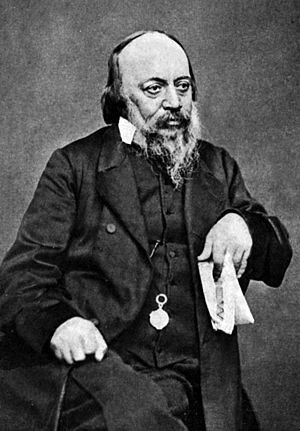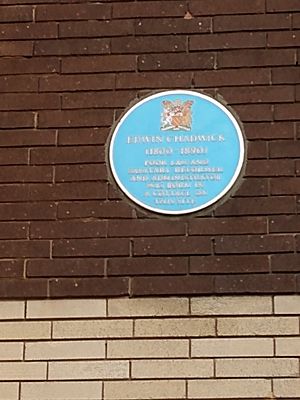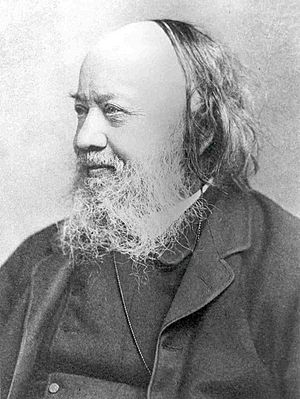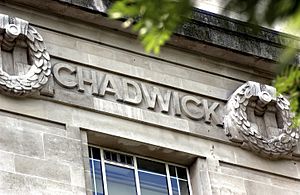Edwin Chadwick facts for kids
Sir Edwin Chadwick was an English social reformer. He is famous for leading big changes to the Poor Laws in England. He also made major improvements in city sanitation (keeping places clean) and public health (keeping people healthy). Chadwick was a follower of the philosopher Jeremy Bentham. He was most active between 1832 and 1854. He was a pioneer in using scientific surveys to understand social problems. He also started long-term inspection programs. These programs made sure that his reforms worked as planned.
Contents
Early Life and Education
Edwin Chadwick was born on January 24, 1800, in Longsight, Manchester. His mother died when he was very young. His father, James Chadwick, taught music and plants to the scientist John Dalton. His father was also a very liberal politician. This meant young Edwin learned about political and social ideas early on. His grandfather was a close friend of the religious leader John Wesley.
Edwin started school in Lancashire and then went to a boarding school in Stockport. He studied there until he was 10 years old. In 1810, his family moved to London. Chadwick continued his education with private teachers, his father, and by teaching himself a lot.
When he was 18, Chadwick decided to become a lawyer. He trained at a lawyer's office. In 1823, he joined law school in London. By 1830, he became a barrister, which is a type of lawyer.
He supported himself by writing. He wrote essays about how to use science to improve government. He became friends with important thinkers like John Stuart Mill and Jeremy Bentham. Bentham even hired him as an assistant and left him money. He also met doctors like Thomas Southwood Smith and Neil Arnott.
Because of his friends and his interest in social change, he started focusing on improving public health. In 1832, Chadwick began his work to make sanitary and health conditions better.
A Leader for Change
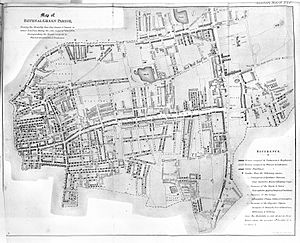
In 1832, Chadwick worked for a special group called the Royal Commission. This group was looking into how the Poor Laws were working. In 1833, he became a full member of this group. Chadwick helped write a famous report in 1834. This report suggested big changes to the old Poor Law.
Under the new 1834 system, local areas were grouped into "Poor Law Unions." Each union was supposed to have a workhouse. Chadwick believed that trained experts should manage help for the poor. He thought this would be better than local elected officials.
In 1834, he became secretary to the Poor Law commissioners. He found it hard to work with his bosses. This was because he wanted to run things his own way. This disagreement led to the Poor Law Commission closing down in 1847. Chadwick believed that experts, not just elected people, should handle local issues.
Improving Sanitation
In 1838, there was a serious outbreak of typhus disease. Chadwick convinced the Poor Law Board that they needed to investigate. His doctor friends, Arnot and Southwood Smith, helped with this. This was the first time doctors in Britain looked at how living conditions affected people's health.
Chadwick sent out questionnaires to every Poor Law Union. He also talked to surveyors, builders, and police officers. He gathered a lot of information about the lives of poor people. He put all this information together himself.
His famous book, Report on The Sanitary Condition of the Labouring Population of Great Britain, was published in 1842. He paid for the research and publishing himself. It became the best-selling government report ever at that time.
He hired John Roe, a surveyor, to test the best ways to build drains. The results were put into his report. The report said that better water supplies and drainage systems were absolutely needed. These changes would help reduce early deaths. Doctors also convinced Chadwick that every house should have a constant water supply.
The report became very popular. The government had to create a Royal Commission on the Health of Towns. This group looked at the problems and suggested new laws. Chadwick worked as an unofficial secretary for this group. He seemed to be in charge of their work.
The Commission heard from engineers who had designed water systems. They agreed with Chadwick's ideas about constant water supplies. He developed a model he called the "venous and arterial system." This meant every house would have constant water. Water-closets (toilets) would send waste into special sewers. This waste would then be used as fertilizer on land, stopping rivers from getting dirty.
After the report, the Health of Towns Association was formed. Chadwick also helped pass the Waterworks Clauses Act in 1847. This law limited how much water companies could charge. It also made them provide clean water constantly to houses.
Chadwick wanted his ideas to be used everywhere. He tried to start a company to supply water to towns. This company would also handle drainage and use waste for farming. It was called "The British, Colonial and Foreign Drainage, Water Supply and Towns Improvement Company." But it was hard to raise money because everyone was investing in railways. The company eventually closed after three years.
Chadwick understood that both water supply and drainage were important. If people had toilets but no sewers, their cesspools (waste pits) would overflow. This would make health conditions even worse.
Public Health Act
Chadwick's report led to the Public Health Act 1848. This was the first time the British government took responsibility for its citizens' health. The Act created a Central Board of Health. Lord Morpeth, Lord Shaftesbury, and Chadwick were members. Dr. Southwood Smith joined later as a medical advisor.
Local areas could ask for an inspector from the Board to visit. If 10% of the local taxpayers signed a petition, an inspector would come. The Board could also investigate if too many people were dying in an area. Chadwick chose all the inspectors himself. He made sure they agreed with his ideas about good sewers and constant water. They worked hard to make sure towns planned complete systems for water and drainage.
However, some engineers did not like Chadwick's ideas. They thought his plans were too simple or not practical. As time went on, more people opposed the Board. They felt it had too much central control. Chadwick and his colleagues had to resign in 1854. The Board closed soon after.
Chadwick lived to see his ideas proven right. In 1871, the Local Government Board was created. This led to the Ministry of Health. Now, it is widely accepted that public health is a government responsibility. Local authorities work to keep people healthy.
In 1851, Chadwick suggested that one group should manage all nine water companies in London. The government said no to this idea. But the Metropolitan Water Supply Act of 1852 made companies clean their water better. It also made them provide constant water to all users. This goal was finally met in 1899. Chadwick's idea for one authority was put in place in 1902.
Chadwick's work was praised by others. For example, Erasmus Wilson dedicated his 1854 book Healthy Skin to Chadwick. He admired Chadwick's hard work for sanitary reform. Chadwick also talked with Florence Nightingale, the famous nurse. He encouraged her to write her book Notes on Nursing. He helped make her work known to important people.
Later Life and Legacy
Chadwick worked for the Metropolitan Commission of Sewers in London from 1848 to 1849. He was also a commissioner for the General Board of Health from 1848 until it closed in 1854. After that, he retired with a pension. He spent the rest of his life helping with health and economic issues.
In 1884, he became the first president of the Association of Public Sanitary Inspectors. This group is now called the Chartered Institute of Environmental Health. Their main office in London is named Chadwick Court in his honor.
Chadwick is known for his work on Poor Laws and sanitation. But he also helped with many other public policies. These included tropical health, justice systems, funeral rules, school buildings, and military health. He investigated child labor in factories and how police forces were organized. He also looked into roads, government workers, and education. He used statistics to collect and organize information for his work.
In 1889, he was made a knight for his public service. He died in 1890 at the age of 90.
Chadwick is remembered at the London School of Hygiene & Tropical Medicine. His name is among 23 pioneers of public health honored there. He is also remembered at Heriot Watt University in Edinburgh, Scotland, where an engineering building is named after him.
See also
 In Spanish: Edwin Chadwick para niños
In Spanish: Edwin Chadwick para niños
 | Sharif Bey |
 | Hale Woodruff |
 | Richmond Barthé |
 | Purvis Young |


